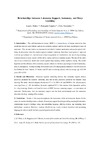Identificador persistente para citar o vincular este elemento:
https://accedacris.ulpgc.es/jspui/handle/10553/74754
| Campo DC | Valor | idioma |
|---|---|---|
| dc.contributor.author | Núñez Alonso, Juan Luis | en_US |
| dc.contributor.author | Grijalvo Lobera, Fernando | en_US |
| dc.contributor.author | Fernández Sarmiento, Celia | en_US |
| dc.date.accessioned | 2020-10-14T14:54:17Z | - |
| dc.date.available | 2020-10-14T14:54:17Z | - |
| dc.date.issued | 2014 | en_US |
| dc.identifier.uri | https://accedacris.ulpgc.es/handle/10553/74754 | - |
| dc.description.abstract | The self-determination theory (SDT) is a macro-theory of human motivation that establishes that the social factors such as the autonomy support satisfies the basic psychological need of autonomy. This, in turn, leads to an increase in individuals’ intrinsic motivation and psychological wellbeing. In classrooms where the teacher supports students’ autonomy, there have been reports of improved academic performance [1], and increased school engagement [2]. Furthermore, the use of deep learning strategies fosters stronger memory of the subject matter and better academic grades. The aim of this study was to test a theoretical model that would explain deep learning within academic setting. The model hypothesized the influence of the autonomy support climate on the basic psychological need of autonomy, and, in consequence, on deep learning. Participants were 276 undergraduate students of the University de Las Palmas de Gran Canaria, 241 female and 29 male (6 missing values), with an average age of 21.80 years (SD = 2.93). | en_US |
| dc.language | eng | en_US |
| dc.source | International Congress on Education, Innovation and Learning Technologies. Barcelona, España. 2014 | en_US |
| dc.subject | 580106 Evaluación de alumnos | en_US |
| dc.subject | 61 Psicología | en_US |
| dc.title | The relationships between autonomy support, autonomy and deep learning | en_US |
| dc.relation.conference | International Congress on Education, Innovation and Learning Technologies | en_US |
| dc.investigacion | Ciencias Sociales y Jurídicas | en_US |
| dc.type2 | Actas de congresos | en_US |
| dc.utils.revision | Sí | en_US |
| dc.identifier.ulpgc | Sí | es |
| item.fulltext | Con texto completo | - |
| item.grantfulltext | open | - |
| crisitem.author.dept | GIR IATEXT: Didáctica, Aprendizaje y Motivación en Contextos Específicos | - |
| crisitem.author.dept | IU de Análisis y Aplicaciones Textuales | - |
| crisitem.author.dept | Departamento de Psicología, Sociología y Trabajo Social | - |
| crisitem.author.dept | GIR IATEXT: Didáctica, Aprendizaje y Motivación en Contextos Específicos | - |
| crisitem.author.dept | IU de Análisis y Aplicaciones Textuales | - |
| crisitem.author.dept | Departamento de Educación | - |
| crisitem.author.orcid | 0000-0002-2400-7843 | - |
| crisitem.author.orcid | 0000-0002-1316-8115 | - |
| crisitem.author.orcid | 0000-0002-8910-7773 | - |
| crisitem.author.parentorg | IU de Análisis y Aplicaciones Textuales | - |
| crisitem.author.parentorg | IU de Análisis y Aplicaciones Textuales | - |
| crisitem.author.fullName | Núñez Alonso, Juan Luis | - |
| crisitem.author.fullName | Grijalvo Lobera, Fernando | - |
| crisitem.author.fullName | Fernández Sarmiento, Celia | - |
| Colección: | Actas de congresos | |
Visitas
182
actualizado el 25-oct-2025
Descargas
40
actualizado el 25-oct-2025
Google ScholarTM
Verifica
Comparte
Exporta metadatos
Los elementos en ULPGC accedaCRIS están protegidos por derechos de autor con todos los derechos reservados, a menos que se indique lo contrario.
